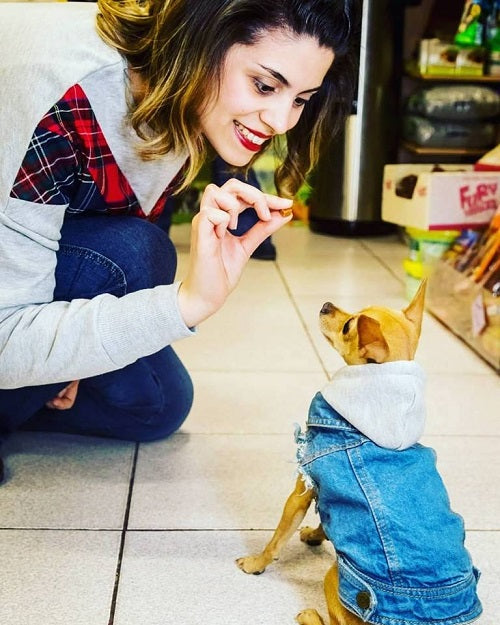
Moving to a new house with the dog: What you should pay attention to
Share
Moving to a new home is a stressful process for your dog. Early planning, patience and affection will help your beloved friend adjust quickly to his new home. Read on for everything you need to know to make moving as easy and smooth as possible.
Before the move
Prepare your dog for the move a few weeks before it happens. Try to keep the dog's routine while you're packing so he doesn't feel like you're neglecting him.
If your dog is not used to being in a bag or carrier, take some time to get used to it. Leave the crate in a certain spot in the house for him to explore and go in, so he feels ready.
In any case, make sure that the animal's carrier is comfortable enough so that it can sleep in it, stretch out, and generally not be too confined.
During the move
Place your dog in a safe, quiet place, such as the bathroom, so he can't escape. It is very likely that the dog will panic and want to leave, so everyone entering the house should know not to open the door to this area. It is good to have everything the dog needs in this area, from water and food to his bed and toys.
However, the dog should definitely wear the collar with its identity, so that it can be found if it gets lost.
Traveling by car
The safest way for a dog to travel is to have an appropriately sized crate for him in the car. Take the time to get your four-legged friend used to traveling in the crate. If you have a puppy, the sooner you start getting him used to traveling in a crate in the car, the better and safer traveling with him will be.
Another solution, especially for large dogs, is to sit in the car seat, where they will be restrained with the special car belt . However, do not let the dog stick its head out of the window, as it can seriously injure itself.
However, if your dog is very stressed in the car, then the cage, possibly in combination with some calming treatment recommended by the vet, is a preferable solution.
However, you should definitely never leave your dog alone in the car, especially in the summer, as he can suffer from heatstroke in a matter of minutes.

Traveling by plane
Air travel with your dog requires advance planning and good organization as there are special health and vaccination requirements for pets.
If you have a small dog, most airlines will allow you to take it on the plane with you. However, if the dog is over a certain kilo, then it will have to travel cargo, so you should contact the airline well in advance.
If your dog has to travel in the special baggage compartment, then it is a good idea to take the same flight, which should ideally be direct, to avoid delays and errors in transport. Talk to your vet about whether it would be appropriate to give your pet some medication to keep them calm during the trip.
Preparing your new home
As you move your crates and belongings to the new home, watch out for items that could cause injury to your dog. Make sure your new home is safe for the dog by checking for potential hazards such as:
- Poisons, cleaners, insect repellents and pesticides where the dog has access
- Worn electrical appliance cables
- Exposed small objects that the dog can swallow and choke on
- Dropping objects from above
- Insufficient fencing in the garden.
Installation in the new house
When you arrive at the new home, open the crate and spend time with your dog to reassure and calm him down. Give him a treat or a new toy so that your dog associates the new place with something beautiful.
Arrange your dog's things in the same way as in the old house, so that he immediately recognizes the familiar objects. By seeing for example his bed, crate, toys and food and water bowls, your dog will be able to settle into his new home quickly.
Let the dog explore his new home and get used to the new sights and smells. You can keep him on a leash during the first walk to ensure he is safe and protected. Make sure all doors and windows are closed so he doesn't accidentally leave.
Taking your dog for a walk in the new neighborhood will also familiarize him with his new surroundings. Be patient and let him explore everything around. In general, your dog will need some time to adjust, but if you maintain his normal routine he will not have too much trouble.




